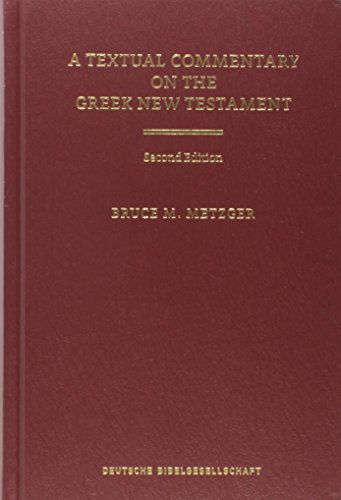 Reddit reviews A Textual Commentary on the Greek New Testament (Ancient Greek Edition)
Reddit reviews A Textual Commentary on the Greek New Testament (Ancient Greek Edition)
We found 6 Reddit comments about A Textual Commentary on the Greek New Testament (Ancient Greek Edition). Here are the top ones, ranked by their Reddit score.

If you can get your hands on a copy of this you'll spend the whole day reading it: http://www.amazon.com/Textual-Commentary-Testament-Ancient-Edition/dp/1598561642
With all due respect to psstein's post, I cannot endorse his syntopic problem list. For sure read Goodacre, but read it knowing that it is highly contentious and still not accepted by the majority of scholars. Streeter is a light and easy read, but he is outdated, having written almost 100 years ago. Farmer's theory, too, has few adherents, and the other two are redundant if you just read Goodacre.
My suggestions include first this article. This will quickly get you caught up on the basics.
For books, Pheme Perkins' Introduction to the Synoptic Problem is a great beginner's guide. I heartily recommend it before diving into the particulars of each major theory.
Speaking of major theory, Kloppenborg's Excavating Q is right up there as the most important book on Q. If you want to understand 2ST, start here.
psstein has it covered with Historical Jesus, though I would also recommend Erhman's Apocalyptic Prophet of the New Millennium.
For textual criticism, you'll want Metzger's Textual Commentary on the New Testament for sure, but do check out Tov's guide on the Hebrew bible while you're at it. (Older version is cheaper.)
https://www.amazon.com/Textual-Commentary-Greek-Testament-Ancient/dp/1598561642
Get yourself a copy. Read the introduction. Get back to me.
>the original text is no longer in circulation. What is read now has been changed and altered a countless amount of times.
How does one prove that claim? Please state specifically where has the text in the manuscripts been changed? And then of course to show that any change has relevance please you'd have to show what doctrine is affected by the difference and to what degree.
Note: citing differences in translations (KJV or ESV vs NLT or LB for example) won't do the trick since those are differences based on different translation methodologies (formal equivalence vs dynamic equivalence)
Edit: Here I will help you out: Here is a site the on textual variants See is any can prove your claim. And then there is a Wiki list of NT variants. Here are two brief videos from Daniel Wallace on New Testament Textual Variants Here is another interesting site and of course one could always get this book You don't "need" to read Greek to glean a lot from it.
The textual notes will be footnotes that tell you what manuscripts have different versions - either insertions/omissions/transposed wording, etc. It's a language to learn all in it's own both what each critical mark means and what the symbols for all the manuscripts means.
The Reader's Edition is great for translating. If you really want to dive into the textual critical part, I'd suggest getting this one. I'd also get the one with textual notes and the accompanying commentary explaining the text selection. It's really a different world from translating, unless you are doing a commentary.
Thanks!
>I have never tried in the Greek.
You should! It's quite rewarding.
As for what I'm using. I thankfully was a step ahead, as I'd studied Classical Attic when I was in college. That was awhile ago, but the alphabet and basic grammar was still floating around my memory. Vocabulary was and is my biggest shortcoming.
To refresh my grammar (and help me with changes in the language from Athens ca. 600 BC to the 1st century Roman Empire), I bought this textbook: Reading Koine Greek by Rodney Decker. It's an introductory one, so I was able to blow through the early lessons quickly enough, while focusing mainly on vocabulary. He structures his vocab lists based on word frequency in the New Testament and Septuagint, meaning you learn more common words first, which in turn helps to quickly build reading comprehension. It also focuses on the grammar of that time period and specifically early Christian writing (with reading exercises mostly from the NT, but occasionally the Septuagint or something like the Apostolic Fathers).
Once I was ready for some more advanced references, I picked up Greek Grammar Beyond the Basics, which is a more general reference book (focused on the NT) recommended by Prof. Decker. I also splurged, thanks to some spare cash, and bought myself the BDAG, an incredibly thorough dictionary of Biblical Greek. The amount of scholarship in that one book is nothing short of mind-boggling. It has an incredible number of references to both the New Testament and tons of other contemporary usage, as well as citing to journal articles about certain words, the works. Oh yeah, I also got a dual-language (Greek and English) edition of the Apostolic Fathers somewhere along the line, although I haven't read it much yet.
So that's where I am. As I said, it's slow going for now since my vocabulary is still pretty bad, but it's improving. And I find that learning by seeing things in context is much better for me than just trying to do flashcards or something (although I may supplement with those).
I have two more books on the way: Metzger's Textual Commentary (where he talks about the decisions that went into which reading they chose in the UBS edition of the NT), and the most recent edition of his The Text of the New Testament (as updated by Bart Ehrman), which is an introduction to NT textual criticism and a kind of summary of various scholarly research on the subject.
So yeah, it's quite an undertaking!